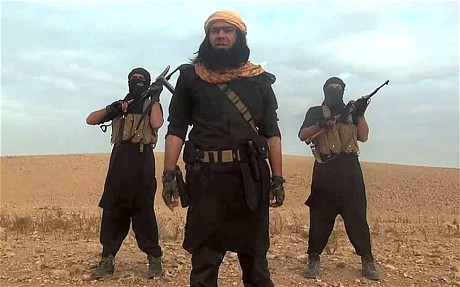Canada’s Foreign Fighter Problem is No Surprise
Over the past week, Global News Canada has released a series of reports from Syria detailing the detention of Muhammed Ali (aka Abu Turaab Al-Kanadi), a high-profile Canadian Islamic State (ISIS) member, by Kurdish forces inside the country. Journalist Stewart Bell and researcher Amarnath Amarasingam travelled to Syria where they interviewed Ali and several other Canadians held in a makeshift detention center in the northeastern part of the state.

Over the past week, Global News Canada has released a series of reports from Syria detailing the detention of Muhammed Ali (aka Abu Turaab Al-Kanadi), a high-profile Canadian Islamic State (ISIS) member, by Kurdish forces inside the country. Journalist Stewart Bell and researcher Amarnath Amarasingam travelled to Syria where they interviewed Ali and several other Canadians held in a makeshift detention center in the northeastern part of the state. In total, at least 13 Canadians—three men, three women and seven children—were transferred to Roj Camp after trying to flee the country, when they were captured by Kurdish forces. Some Canadians have reportedly been in detention for almost a year.
Since the story broke, Global Affairs Canada, the department that manages diplomatic and consular relations, has said very little beyond the fact that they have limited ability to provide consular assistance in Syria but are working on the detainees’ cases. (Canada has not had a diplomatic presence in Syria since violence broke out in 2012.) Bell reports that Kurdish forces want the Canadian government to take responsibility for its citizens in their custody. Ostensibly, the positive dialogue that initially took place between the Kurds and Canadian consular officials based in Beirut has stalled in recent months. Some of the Canadians in detention have spoken with diplomatic officials, but none have been interviewed by members of the Royal Canadian Mounted Police (RCMP) or the Canadian Security Intelligence Service (CSIS). What’s more, Ali, an alleged ISIS sniper, has never been charged with a criminal offence in Canada despite his frequent, and often horrific, posts on Twitter in support of ISIS and domestic acts of terrorism.
While the investigative reporting by Bell is remarkable, details of this story should not surprise anyone who has been paying attention to Canadian counterterrorism efforts in recent years.
Canada’s Repatriation Problem
In the past decade, the Canadian government has paid out more than 50 million Canadian dollars (largely for civil liberties violations) to Canadians detained by foreign governments for their alleged participation in or facilitation of terrorist activities. The most notorious case is that of Omar Khadr, a Canadian who was imprisoned in Guantanamo Bay and convicted in the U.S. of throwing a grenade and killing an American soldier in Afghanistan when Khadr was fifteen. In 2010, the Supreme Court of Canada found that the actions of CSIS and diplomatic officials during his detention contributed to the unjustified violations of Khadr’s right to life and security. He subsequently sued the state, and the lawsuit settled in 2017 for CA$10.5 million. Such a settlement was not without precedent. In 2007, the government paid Mahar Arar CA$10 million compensation for its part in his rendition from the U.S. to Syria, where he was tortured. Most recently, the government reached an agreement to pay CA$31 million to Abdullah Almalki, Ahmad Abou-Elmaati and Muayyed Nureddin, once again for the state’s role in their detentions and mistreatment in Syria.
That settlement, as well as Mr. Arar’s, were both proceeded by Commissions of Inquiry (commonly known as the Iacobucci Commission and the O’Connor Commision) established to investigate Canada’s information-sharing practices and how those practices contributed to the detention of the four men in Syria, their interrogation by Canadian officials while in custody, and Canada’s diplomatic efforts to have them repatriated. Both commissions found that efforts made by CSIS and the RCMP to gather information from Arar, Almalki and Elmaati indirectly contributed to their mistreatment and that the provision of Canadian consular services was deficient.
What’s more, another civil suit brought by Abousfian Abdelrazik against the government was set to begin in September 2018 but was adjourned to allow for the review of additional disclosure. Abdelrazik was reportedly detained and tortured in Sudan in 2003 for suspected ties to terrorism. In 2009, the Federal Court found that the Canadian government violated his charter right to enter Canada by sending CSIS officials to question him in Sudan—thus being complicit in his detention—and by determining not to make any efforts to have him returned to Canada.
Given this history, it is not surprising that Canadian officials are moving cautiously with respect those citizens in Kurdish custody. The RCMP and CSIS have apparently learned their lesson and are rightfully keeping their distance from Roj Camp. We should expect that distance to continue and for diplomatic officials to work diligently but silently to ensure the safe treatment—if not the eventual return—of these Canadians. Furthermore, any consular efforts will be complicated by the fact that Ali and the other adults are reportedly self-proclaimed ISIS members and supporters, who are imprisoned by a non-state opposition force inside a country that continues to be in an armed conflict with ISIS and other insurgent groups and with which Canada has no official diplomatic relations. What’s more, it’s entirely unclear what would happen to Ali et al. upon their return to Canada, as none of them have been charged with a criminal offence.
Canada’s Prosecution Problem
In November 2017, Canadian Minister of Public Safety Ralph Goodale acknowledged that "[w]ith the battlefield activity winding down, there is a very real question about where the foreign fighters go.” We now know that when the Minister spoke these words, Canadians were already in Kurdish detention.
We also know that approximately 60 of the estimated 200 Canadian persons suspected of travelling overseas to join or support terrorist organizations like ISIS have returned to live in Canada, and that, to date, only two have been prosecuted for their activities. Of the two, Sabrine Djermane was acquitted of all charges, and her boyfriend El Mahdi Jamali was found not guilty of the counts as charged, and instead found guilty of a lesser included offence of possession of explosive substances. A handful of others have been charged in absentia. For example, in 2015, Farah Mohamed Shirdon and John McGuire were charged with several offences under the Criminal Code, although both are now presumed to have died in Syria before charges were laid.
Amongst the returnees whom the RCMP has failed to charge is Abu Huzaifa al-Kanadi, the Canadian ISIS member at the centre of the popular New York Times podcast “Caliphate.” Now in Toronto, Huzaifa gave the Times detailed accounts of carrying out executions while a member of ISIS in Syria. Although the veracity of his claims has been called into question, Huzaifa also previously told Canadian reporters that he worked as an enforcer for ISIS.
It is unsurprising that, given this track record, the political opposition has repeatedly called on Trudeau’s Liberal Government to account for the lack of prosecutions of returning foreign fighters, and even suggested that Canadians who remain abroad ought to be targeted and killed before they return home and put citizens at risk. In response, Minister Goodale explained that Canada prefers to lay charges rather than target citizens on enemy soil. "When evidence is available charges are laid,” said the Minister in the House of Commons, “[w]hen prosecutions are possible,” he continued, “they are prosecuted to the fullest extent of the law.”
So why then has the RCMP not arrested Huzaifa or charged Ali in absentia? It is not because Canada lacks the legislative mandate. Several Criminal Code provisions make it illegal to travel abroad to participate in or facilitate the activities of a terrorist group or to commit terrorist acts. All terrorism offences, including advocating or promoting terrorism, have extraterritorial reach. The real problem, noted Minister Goodale, is how to use information collected as intelligence as evidence in a criminal trial.
While this is undoubtedly true, not all countries similarly struggle to bring terrorists to justice. Canada’s comparative capacity to bring charges and successfully prosecute terrorism offences (even when the criminal activity takes place domestically) pales in comparison to the U.S, and the UK. Between 2001 and June 2018, the RCMP has charged a mere 55 individuals with terrorism offences and prosecuted significantly fewer. (That includes the 2 individuals who were prosecuted out of the approximately 200 who have travelled abroad to support terrorist groups.) What’s more, a Commission of Inquiry identified Canada’s intelligence-to-evidence problem almost a decade ago.
The Commission of Inquiry into the Investigation of the Bombing of Air India Flight 182 was tasked with investigating the attack, the investigation of the bombing and the failed prosecution of those alleged to be responsible. The Air India bombing, which killed 329 passengers, remains the deadliest terrorist attack in Canadian history, and yet it took almost two decades to bring the perpetrators to trial. When hearings finally commenced in 2003, only three people stood charged. The attack’s mastermind, Inderjit Singh Reyat, ultimately plead guilty to manslaughter before the conclusion of the 217-day judge-alone trial. The two other accused individuals, Ripudaman Singh Malik and Ajaib Singh Bagri, were acquitted.
Published in 2010, the Commission’s final report devoted an entire volume to Canada’s intelligence-to-evidence dilemma and recommended a series of reforms. Inexplicably, these reforms remain unadopted even though this problem continues to hinder Canada’s ability to hold those engaged in terrorist activity criminally responsible.
Now is the time to act. On 22 October the Conservative Party tabled a motion in the House of Commons formally calling on the government to:
(a) refrain from repeating the past mistakes of paying terrorists with taxpayers’ dollars or trying to reintegrate returning terrorists back into Canadian society; and (b) table within 45 days after the adoption of this motion a plan to immediately bring to justice anyone who has fought as an ISIS terrorist or participated in any terrorist activity, including those who are in Canada or have Canadian citizenship.
The Liberals did not oppose the motion, which makes it a formal order, and may be a signal that they are going to seize this window of opportunity and finally muster the political will to implement the institutional and evidentiary reforms necessary to prosecute foreign fighters for their crimes. That would be a surprise.
Correction (October 24, 2018, 9:54pm): An earlier version misidentified the individual convicted of manslaughter for the Air India Bombing as Talsinder Singh Parmar. In fact, Inderjit Singh Reyat pleaded guilty to manslaughter in connection with the attack. The Commission of Inquiry identified Parmar as the leader of the conspiracy, though he was never convicted.





